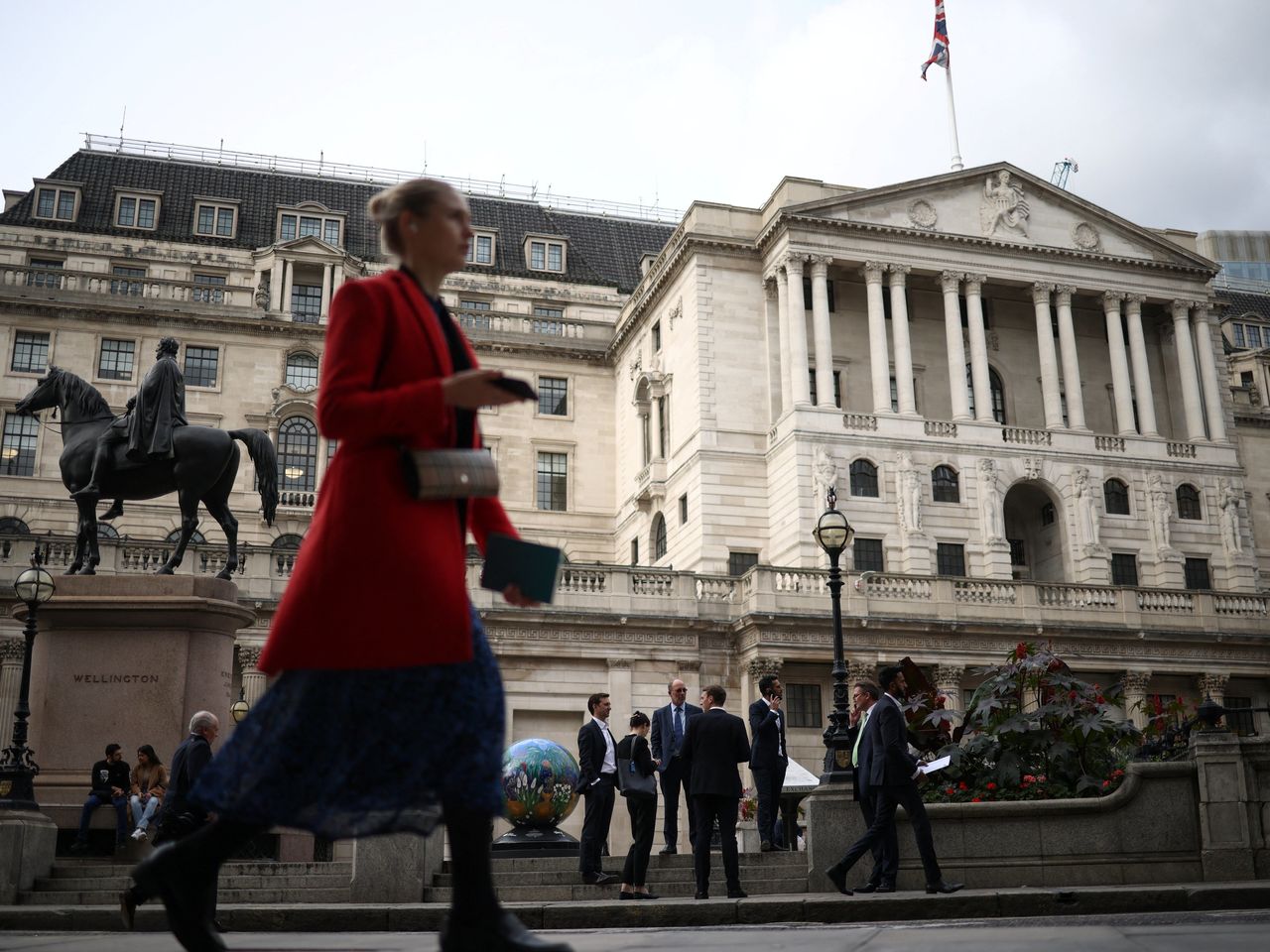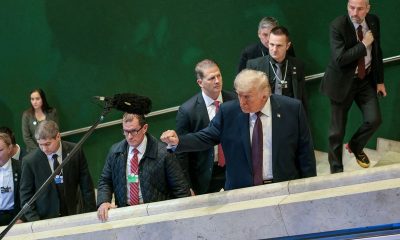Economy
High inflation and recession risk — the Bank of England’s dilemma

The Bank of England is trying to curb an inflation rate that is running higher in Britain than in the United States and the euro zone, without pushing the economy into a recession after having already increased borrowing costs 12 times since late 2021.
The BoE is expected to raise rates again, to 4.75% from 4.5%, on June 22 after inflation slowed by less than it hoped in April. Investors see a roughly 60% chance that Bank Rate will climb to 5.5% later this year.
Nonetheless, two of the Monetary Policy Committee’s nine members say the delayed impact on the economy of the BoE’s rate hikes to date mean there is no need to tighten policy any further.
Below is a summary of the factors the BoE is weighing up as it approaches its next meeting.
INFLATION
British consumer price inflation (CPI) fell to 8.7% in annual terms in April, down from 10.1% in March but higher than the BoE’s forecast of 8.4%. It was the joint highest among Group of Seven advanced economies alongside Italy’s.
More worrying for the BoE, two measures of underlying price growth — core inflation, which excludes energy, food and tobacco prices, and price increases in the services sector — both hit their highest rates since 1992.
However, analysts polled by Reuters last month forecast that headline CPI will slow to 3.7% in the fourth quarter of this year and to just above the BoE’s target of 2% in a year’s time as last year’s surge in energy prices drops out of the figures. The analysts mostly expected the Bank Rate to peak at 5.0%.
INFLATION EXPECTATIONS
The BoE takes comfort from signs that inflation expectations are falling after rising in recent months.
Public expectations for inflation over five to 10 years — which are watched closely by the central bank — eased in May to their lowest in nearly two years at 3.5%, according to a survey by U.S. bank Citi and polling firm YouGov.
Companies surveyed by the BoE in May intended to raise prices by 5.1% over the coming year, down from 5.9% in April’s survey, the lowest since Russia’s invasion of Ukraine.
WAGE SETTLEMENTS
The same BoE survey showed businesses planned to raise wages by 5.2% over the coming year, down from expectations of 5.4% in April and the lowest since July 2022.
But data from human resources firm XpertHR showed pay settlements by employers held at 6% in the three months to April, matching recent record increases.
INFLATION HEAT IN THE LABOUR MARKET
The BoE is worried about long-term inflation heat from the labour market where a shortage of workers, caused by a rise in the number of long-term sicknesses after the COVID-19 pandemic, has been compounded by new Brexit rules on European Union workers.
There have been some signs of an easing of that pressure recently. More people sought to get back into work in the first three months of the year, pushing down Britain’s inactivity rate and easing the need for employers to raise pay to attract workers.
THE RATE HIKES ALREADY IN THE PIPELINE
The BoE knows much of the impact of its 12 rate hikes to date has yet to be felt because most mortgages in Britain are fixed-rate deals which protect home-owners from swings in borrowing costs but will come up for renewal at higher rates.
The BoE said in May that 1.3 million fixed-rate mortgages were due to mature by the end of 2023 with more up for renewal in 2024 and beyond, meaning much of the hit to household budgets has yet to be felt.
RECESSION RISK REMAINS
Britain’s economy has so far defied recession forecasts made only a few months ago, but it remains fragile and the recent jump in expectations of higher borrowing costs may yet tip it into a contraction this year.
British gross domestic product has recovered from the COVID pandemic more slowly than all the other G7 economies bar Germany, according to data for the first three months of 2023.
Economy
Russian central bank says it needs months to make sure CPI falling before rate cuts -RBC


© Reuters. Russian Central Bank Governor Elvira Nabiullina attends a news conference in Moscow, Russia June 14, 2019. REUTERS/Shamil Zhumatov/File Photo
MOSCOW (Reuters) – Russia’s central bank will need two to three months to make sure that inflation is steadily declining before taking any decision on interest rate cuts, the bank’s governor Elvira Nabiullina told RBC media on Sunday.
The central bank raised its key interest rate by 100 basis points to 16% earlier in December, hiking for the fifth consecutive meeting in response to stubborn inflation, and suggested that its tightening cycle was nearly over.
Nabiullina said it was not yet clear when exactly the regulator would start cutting rates, however.
“We really need to make sure that inflation is steadily decreasing, that these are not one-off factors that can affect the rate of price growth in a particular month,” she said.
Nabiullina said the bank was taking into account a wide range of indicators but primarily those that “characterize the stability of inflation”.
“This will take two or three months or more – it depends on how much the wide range of indicators that characterize sustainable inflation declines,” she said.
The bank will next convene to set its benchmark rate on Feb. 16.
The governor also said the bank should have started monetary policy tightening earlier than in July, when it embarked on the rate-hiking cycle.
Economy
China identifies second set of projects in $140 billion spending plan


© Reuters. FILE PHOTO: Workers walk past an under-construction area with completed office towers in the background, in Shenzhen’s Qianhai new district, Guangdong province, China August 25, 2023. REUTERS/David Kirton/File Photo
SHANGHAI (Reuters) – China’s top planning body said on Saturday it had identified a second batch of public investment projects, including flood control and disaster relief programmes, under a bond issuance and investment plan announced in October to boost the economy.
With the latest tranche, China has now earmarked more than 800 billion yuan of its 1 trillion yuan ($140 billion) in additional government bond issuance in the fourth quarter, as it focuses on fiscal steps to shore up the flagging economy.
The National Development and Reform Commission (NDRC) said in a statement on Saturday it had identified 9,600 projects with planned investment of more than 560 billion yuan.
China’s economy, the world’s second largest, is struggling to regain its footing post-COVID-19 as policymakers grapple with tepid consumer demand, weak exports, falling foreign investment and a deepening real estate crisis.
The 1 trillion yuan in additional bond issuance will widen China’s 2023 budget deficit ratio to around 3.8 percent from 3 percent, the state-run Xinhua news agency has said.
“Construction of the projects will improve China’s flood control system, emergency response mechanism and disaster relief capabilities, and better protect people’s lives and property, so it is very significant,” the NDRC said.
The agency said it will coordinate with other government bodies to make sure that funds are allocated speedily for investment and that high standards of quality are maintained in project construction.
($1 = 7.1315 renminbi)
Economy
Russian central bank says it needs months to make sure CPI falling before rate cuts -RBC


© Reuters. Russian Central Bank Governor Elvira Nabiullina attends a news conference in Moscow, Russia June 14, 2019. REUTERS/Shamil Zhumatov/File Photo
MOSCOW (Reuters) – Russia’s central bank will need two to three months to make sure that inflation is steadily declining before taking any decision on interest rate cuts, the bank’s governor Elvira Nabiullina told RBC media on Sunday.
The central bank raised its key interest rate by 100 basis points to 16% earlier in December, hiking for the fifth consecutive meeting in response to stubborn inflation, and suggested that its tightening cycle was nearly over.
Nabiullina said it was not yet clear when exactly the regulator would start cutting rates, however.
“We really need to make sure that inflation is steadily decreasing, that these are not one-off factors that can affect the rate of price growth in a particular month,” she said.
Nabiullina said the bank was taking into account a wide range of indicators but primarily those that “characterize the stability of inflation”.
“This will take two or three months or more – it depends on how much the wide range of indicators that characterize sustainable inflation declines,” she said.
The bank will next convene to set its benchmark rate on Feb. 16.
The governor also said the bank should have started monetary policy tightening earlier than in July, when it embarked on the rate-hiking cycle.

 Forex4 years ago
Forex4 years agoForex Today: the dollar is gaining strength amid gloomy sentiment at the start of the Fed’s week

 Forex3 years ago
Forex3 years agoUnbiased review of Pocket Option broker

 Forex3 years ago
Forex3 years agoDollar to pound sterling exchange rate today: Pound plummeted to its lowest since 1985

 Forex3 years ago
Forex3 years agoHow is the Australian dollar doing today?

 Cryptocurrency4 years ago
Cryptocurrency4 years agoWhat happened in the crypto market – current events today

 World3 years ago
World3 years agoWhy are modern video games an art form?

 Commodities3 years ago
Commodities3 years agoCopper continues to fall in price on expectations of lower demand in China

 Economy3 years ago
Economy3 years agoCrude oil tankers double in price due to EU anti-Russian sanctions























